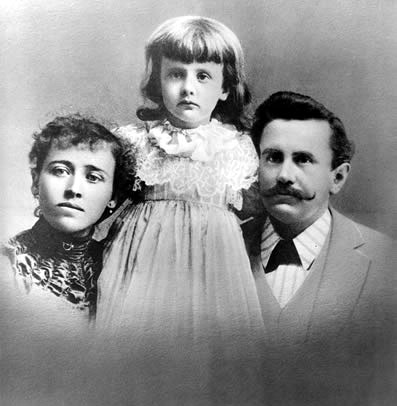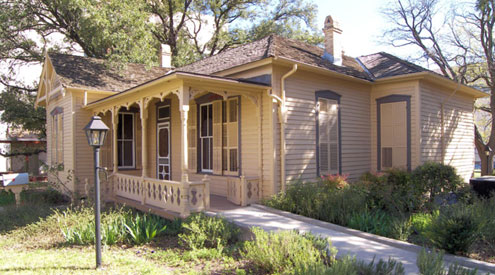|
Printed From North Texas e-News == ntxe-news.com Front Page
When we last left Lillian Greer, it was the spring of 1905 and she was on the train leaving a two-year teaching assignment at Grayson College in Whitewright to ride the rails back to her home in Waco where she would teach in the public school system. We won't meet up with Miss Lillian for another five years when she climbs aboard another train, this time bound for New Mexico Territory to become Mrs. Roy Bedichek. In 1910, Lillian would be leaving behind the family's new home and a comfortable life in Waco where her father, James Francis Greer, served as vice president at Baylor University to live in the untamed New Mexico Territory on a mesquite-covered desert homestead in a cabin Bedichek had warned her had "holes in the walls big enough to throw a cat through." "Bedi and I came by our delusion honestly," Lillian Bedichek would write so stoically many years later in the first chapter of The Roy Bedichek Family Letters. "His forbears and mine had trekked across a continent a generation-jump at a time, from South Carolina, Virginia and Maryland to Kentucky, Louisiana, Missouri, Illinois and finally Texas. The momentum of three generations shoved us on." But three years before Lillian ever laid eyes on her husband-to-be, she had spent a wonderful afternoon with John Avery Lomax. Miss Greer was among many of the top students at Baylor who filled several train cars for a ride to Austin in 1899 to test their metal at an interschool debate, quite possibly a forerunner of today's UIL competitions. It was a grand occasion, by all accounts, with The University graciously entertaining their guests from Waco at the dam. And it was also a great recruiting tool, because Lillian and a friend from Baylor, Kate Carroll, made it a point to stop by the UT Registrar's office where a dashing young John Lomax asked if he might have the pleasure of escorting the young ladies for a day of sightseeing. So, Kate, Lillian and John set off for a memorable day in Austin, highlighted by an afternoon ride on a riverboat. Three years later, and still only a tender young thing of 17, Lillian Greer stepped into the UT Registrar's office again, this time to transfer from Baylor to The University. This time it was Roy Bedichek working the registrar's window. As Lillian turned and walked away, Roy had an epiphany. "That's the girl I'm going to marry," Bedichek whispered to Lomax. Lomax certainly hadn't forgotten the riverboat cruise with Lillian, but he was perceptive enough at this moment in the registrar's office to remain in the wings while the lead characters slowly circled each other onstage. Now that Lillian was out of earshot, Lomax explained why he was qualified to recommend this young lady to his friend and employee. "Well, I know her well," Lomax said quietly to Bedichek. "I spend an entire day with her once." That fateful meeting occurred in 1902, the same year Harry Peyton Steger showed up in Bonham, much to the surprise of many residents who were waiting on great accomplishments from the gifted scholar, to teach Greek and Latin for a year at Bonham High School. And it was in 1902 that William Sydney Porter, better known as O. Henry, showed up in New York City. But, to understand one of the underlying forces that drove the prolific short story author in the Big Apple, it is necessary to understand what drove Porter out of Texas in the first place. People often equate fame with success and happiness. Fame brings notoriety, which can often be translated into financial gain. Neither have much to do with happiness, with the possible exception of making happiness far more complicated. Take the case of one William Sydney Porter. It would have been his gain, although our loss, if there had never been a need to invent O. Henry. Porter would probably been much happier if he had just retired from his job at the General Land Office in Austin and spent every precious minute he could with his petite and lovely wife, Athol, and little Margaret, their daughter. He left his native North Carolina for Texas back in 1882 in search of his health. He found it--and so much more. For a couple of years, Porter worked a number of odd jobs, from ranch hand to cook, as he worked his way towards Austin. The outgoing and charismatic William Sydney Porter that took Austin by storm in 1884 was nothing like the reclusive and reluctant interview subject that Harry Peyton Steger would sit across the room from about 25 years later. The article ran in the New York Times, although Porter had skillfully left out the part about how he had to do a little running himself. The Porter that the people in Austin knew in the mid-1880s was active in many social circles. William Sydney Porter and his future bride, Athol Estes enjoyed performing in local theatre groups and both loved music. William Sydney Porter had a smooth singing voice and had taught himself to play the guitar and mandolin. At first, he even performed with the Hill City Quartet at civic functions. And he began to find his writer's voice, as well. Athol enjoyed her husband-to-be's initial efforts and urged him to pursue his passion for literature. As an outgoing young man about town, William Sydney Porter had plenty of influential friends, including Texas Land Commissioner Richard Hall, who gave Porter a job at the General Land Office. Those may very well have been the happiest days of Porter's life. But Athol was in poor health, weakened by tuberculosis. Her well-to-do family had even considered her too ill to marry, but the amorous couple eloped against their wishes. In 1887, a year after William Sydney secured steady employment at the GLO, Athol presented her loving husband with baby boy, but the infant only survived a few hours. About a year later, Margaret Porter was born. The following year, 1890, Richard Hall ran for governor and lost. William Sydney Porter resigned his political post at the General Land Office and stepped out onto a slippery slope destiny had waiting. Porter ventured into banking and then newspaper business, although maybe both would be better described as misadventures. Porter was a teller and bookkeeper at the First National Bank in Austin and he purchased The Iconoclast from William Cowper Brann and turned it into The Rolling Stone, a weekly paper that published the first short stories of the man that America would later know as O. Henry. (Porter would shortly thereafter sell The Iconoclast and its archives back to Brann, but that is a tumultuous story and one that really stands alone.) Trouble was close behind. In 1894, the bank's management felt they had sufficient reason to suspect Porter of suspicious bookkeeping entries and fired him. Money is the most addictive substance known to man because it fuels all other addictions. If the bank had anything less than a meticulous series of checks and balances to deter temptations and if Porter was keeping his paper alive with under-the-table personal loans, well, he certainly wouldn't have been the first or last to fall into that trap. The Rolling Stone went under a year later. As fate would have it, Porter had caught the eye of the editor at the Houston Post and the newspaper gave Porter a job. However, while he was learning the ropes of being a big city columnist, the federal auditors were learning more about some questionable dealings at the First National Bank of Austin. A federal indictment for embezzlement was handed down with his name front and center, although Porter vehemently denied his guilt. Porter's wealthy father-in-law posted bond. Porter jumped bail. Before jumping to the conclusion that Porter ran out on his family, there is obviously more to this story than meets the eye and more than Porter would even confide to the close friend he would name as his literary executor, Harry Peyton Steger. In an important media release Steger had instigated on behalf of Doubleday Publishing Company, Porter told about some time spent in Honduras. Without beginning to understand the complexity of the situation, the interviewer asked point blank how Porter had financed the South American excursion. "Well, y'see, I had a friend with money," Porter replied. "Wonderful thing, isn't that...a friend with money." Maybe it was actually a friend with money; he had several that qualified. Maybe his family helped him run. Maybe, by now, Porter had endeared himself to the wealthy family that had opposed this marriage in the first place. Whoever it was that came to Porter's aid in that dark hour, he never so much as whispered their name to anyone. It just might be that, whether innocent or guilty, William Sydney Porter thought the one chance to spend the rest of his life with Athol was a clandestine relocation. He spent time New Orleans before it slowly sunk in that this would at best be a temporary respite from federal authorities and a mounting list of charges. So, when the Deep South didn't offer enough cover, Porter set sail for South America. The trade routes from New Orleans were busy with everything from ripe bananas to rowdy mercenaries, so someone dodging small-time embezzlement charges could have easily disappeared for good in a thatched-roof bungalow in any one of a half-dozen banana republics, which, by the way, is a term Porter first coined. He was laying low in Honduras when the message came. Not only was Athol too weak to join him, but she was fading fast. Porter gave up his freedom for a chance to say goodbye to the love of his life. He sailed north and this time it wasn't the arts and music scene waiting for him in Austin. It was the law. Porter turned himself in to authorities in Austin in February of 1897. Porter's father-in-law was there to bail him out so he could spend precious time with Athol. On July 25, 1897 Athol Estes Porter closed her eyes for the last time. On March 25, 1898, the cell door closed behind prisoner 30664 in the Ohio Penitentiary. In 1899, the December issue of McClure's Magazine had an interesting short story called "Whistling Dick's Christmas Stocking" by a new writer on the national scene, O. Henry. Porter was serving what turned out to be a three-year sentence and, at the same time, he was well on his way to becoming famous. Maybe it remains a matter of perspective which one did him the most harm in the long run. previous Steger articles http://www.ntxe-news.com/artman/publish/article_45800.shtml http://www.ntxe-news.com/artman/publish/article_45392.shtml http://www.ntxe-news.com/artman/publish/article_45371.shtml http://www.ntxe-news.com/artman/publish/article_44597.shtml http://www.ntxe-news.com/artman/publish/article_45014.shtml http://www.ntxe-news.com/artman/publish/article_44642.shtml http://www.ntxe-news.com/artman/publish/article_44471.shtml http://www.ntxe-news.com/artman/publish/article_43963.shtml http://www.ntxe-news.com/artman/publish/article_43514.shtml http://www.ntxe-news.com/artman/publish/article_42785.shtml http://www.ntxe-news.com/artman/publish/article_42657.shtml http://www.ntxe-news.com/artman/publish/article_42669.shtml http://www.ntxe-news.com/artman/publish/article_42541.shtml http://www.ntxe-news.com/artman/publish/article_41825.shtml http://www.ntxe-news.com/artman/publish/article_42012.shtml http://www.ntxe-news.com/artman/publish/article_41543.shtml http://www.ntxe-news.com/artman/publish/article_41495.shtml http://www.ntxe-news.com/artman/publish/article_37294.shtml © Copyright 2002-2005 by North Texas e-News, llc. |

